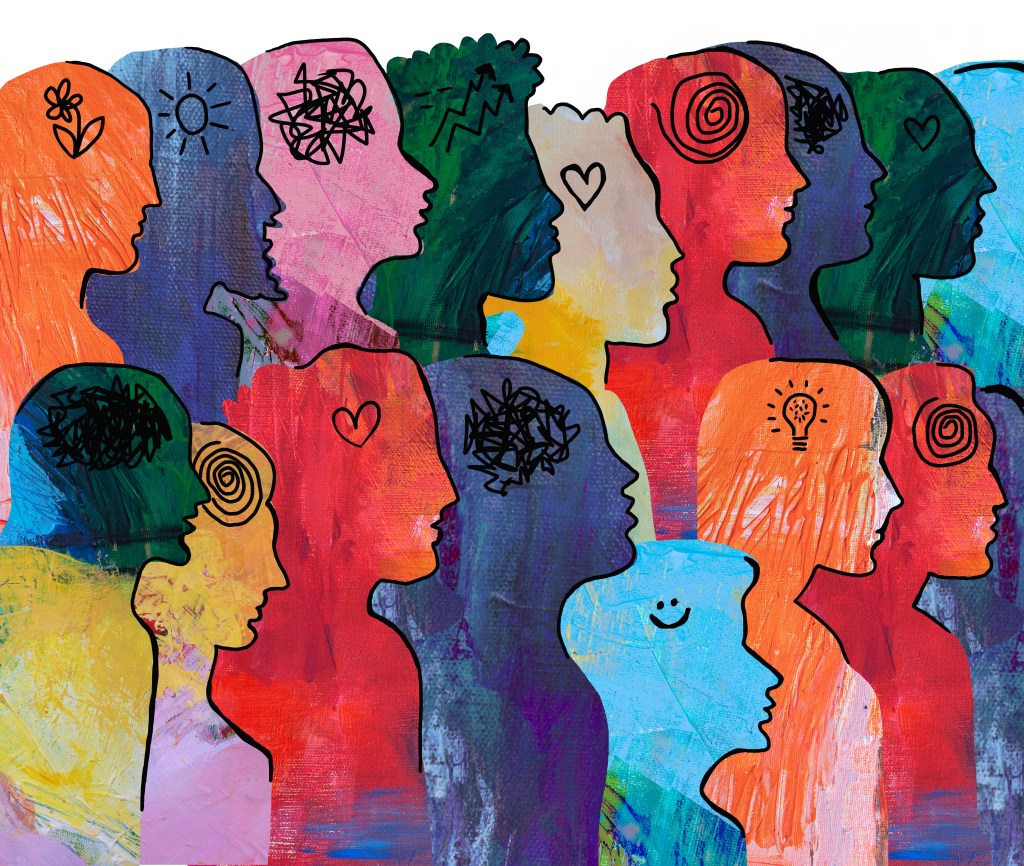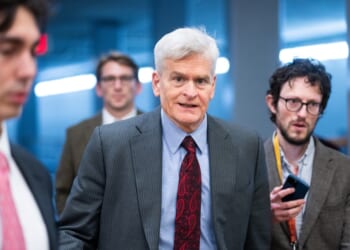
I’ll spare you a rehash of my Critical Trump Theory argument, in part because Trump’s solipsism isn’t a coherent political theory. As even Marjorie Taylor Greene is learning, for Trump, MAGA, America First, the GOP, these are all mere instruments of his will and self-interest, and if you have an agenda that conflicts with his, then he will deny you the ability to use any of those labels. Trumpism is about Trump.
Instead, just look at social media at any given moment. Candace Owens is racking up clicks-and-prayers because she has announced that the president of France, in coordination with Israel, has ordered her assassination. She offers no evidence. She just says it’s true, so it must be. Apparently, her claims that the moon landing was faked aren’t generating traffic the way they once did. Meanwhile, Milo Yiannopoulos (remember him?), tells us “You’re not ready for this truth, but the Jews did Pearl Harbor.”
And, of course, everyone is familiar with Tucker Carlson’s nonsense—about World War II, January 6, the glories of Russian supermarkets, the unfair treatment of Nick Fuentes, and so on. A lot of people think Tucker has only recently gone wackadoo. I concede he’s gotten worse, but let’s not forget that Fox’s lawyers argued in court five years ago that Carlson’s outright statements of fact “cannot reasonably be interpreted as facts” by informed viewers.
Let’s widen the lens even more.
Robert F. Kennedy Jr., the health and human services secretary, is throwing out the sound science of vaccines like it’s so much water-damaged debris in his double-wide. Dan Bongino is the No. 2 man at the FBI, and it wasn’t long ago that he explained, “My entire life right now is owning the libs.” The No. 1 guy at the FBI, Kash Patel, is an inveterate peddler of conspiracy theories. The Pentagon has launched an investigation against Navy veteran Sen. Mark Kelly, who said that members of the military shouldn’t follow illegal orders, because the president claims such advice is “sedition of the highest order.” Marco Rubio—the closest thing we have to a grown up in the administration—insists that he didn’t call a Russian wish list of a peace plan a “wish list,” even though a bunch of senators—Democrat and Republican—heard him say it. At every level it’s like Rudy Giuliani—recently pardoned by Trump—was speaking for this entire crowd back in 2018 when he said “truth isn’t truth.” They’re all so post-truth, the president should have an ironic social media platform called “Truth” so he can post post-truth statements all day. Oh wait, he does.
It’s easy to get caught up in cynical explanations for all of this, even if those explanations are not unfounded. But focusing on the trees misses the forest: The right has a massive relativism problem. Which is to say, the country has a massive problem because parts of the left have had a relativism agenda for generations.
That’s what I mean when I say the left won. As with the Alinsky stuff, much of the right has embraced an “if you can’t beat ‘em, join ‘em” approach to, well, metaphysics.
The opening of the American mind.
Allan Bloom’s The Closing of the American Mind begins with the following: “There is one thing a professor can be absolutely certain of: almost every student entering the university believes, or says he believes, that truth is relative.”
You should read Closing if you haven’t. I recently picked it back up and found all manner of things I either forgot, missed, or didn’t understand 30 years ago. But the major point for now is that the book’s title was ironic because the problem he was assailing was the epidemic of open-mindedness—or what he called “openness”—in American intellectual life and culture.
Openness takes as a given that all perspectives have merit. That you can’t judge, rank, or deny the validity of different points of view. Even claims of fact get reduced to “that’s just your opinion, man.”
Writing of the students he encountered over decades of teaching, Bloom observes, “The danger they have been taught to fear from absolutism is not error but intolerance. Relativism is necessary to openness; and this is the virtue, the only virtue, which all primary education for more than fifty years has dedicated itself to inculcating.”
Note, he’s not talking about “liberal” or left-wing students, but students—elite students—in general. He may have been overstating things, but he was overstating a truth.
We’ll come back to Bloom, but it’s worth noting that Bloom’s argument was in many respects an updating of an argument by conservatives—and traditional liberals—going back generations. Two of my favorite writers, C.S. Lewis and G.K. Chesterton, identified the same problems with excessive open-mindedness.
I should say that open-mindedness is philosophically a form of skepticism—the fashionably sophisticated view that received truths should be dissected and logic-chopped. Obviously, there is nothing wrong with such skepticism, if and when it is deployed in service of discovering the actual truth. But you cannot engage in a process of discovering the actual truth if you start the quest believing there is no such thing as truth.
Let me stipulate that there are some senses in which truth is indeed relative. My wife thinks the house is too cold; I think it’s warm. We’re both telling the truth about our perceptions. But external truth is that the temperature of the house is what it is regardless of our individual feelings.
Philosophers have known for millennia that perceptions are shot through with relativism. That’s the point of “The Blind Men and the Elephant.” But the elephant in that parable is still, you know, an elephant.
“Merely having an open mind is nothing,” Chesterton wrote. “The object of opening the mind, as of opening the mouth, is to shut it again on something solid.” Or as C.S. Lewis put it in The Abolition of Man:
You cannot go on “seeing through” things for ever. The whole point of seeing through something is to see something through it. It is good that the window should be transparent, because the street or garden beyond it is opaque. How if you saw through the garden too? It is no use trying to “see through” first principles. If you see through everything, then everything is transparent. But a wholly transparent world is an invisible world. To “see through” all things is the same as not to see.
One of the chief rhetorical tools of “seeing through” on the right these days is “just asking questions.” “Do the Jews run the world?” “Did America really put a man on the moon?” “Who says that feudalism wasn’t a better way to organize society?” “What would be so bad with having a king?” “How could the Germans have possibly killed that many Jews?”
“Why are you getting so angry? I’m just asking questions.”
The point of “just asking” such questions isn’t to find answers—never mind truth—but to question the idea that truth is ever possible. It thrives on the suspicion that everything we’re told is a lie. That behind the Potemkin façade of the establishment are sinister or even demonic forces, conspiring to manipulate the world to their benefit.
In Closing, Bloom tells a story about his first history professor, a “famous scholar” who demeaned George Washington and the founders. Bloom asked him whether the picture the professor painted of Washington might make us “despise our regime.”
“Not at all,” he said, “it doesn’t depend on individuals but on our having good democratic values.” To which I rejoined, ‘But you just showed us that Washington was only using those values to further the class interests of the Virginia squirearchy.’ He got angry, and that was the end of it.”
I do wonder if that professor was Charles Beard, the historian who popularized the theory that the American founding was all about the greedy self-interest of the founders.
It’s amazing to me how many people on the right can (rightly!) denounce the 1619 Project as a racialized version of Beard’s project, but yawn at the equally sophisticated tendentious denunciations of the American regime by conservative intellectuals and various “influencers.” As shoddy as the 1619 Project was, it was vastly more serious and grounded in facts than “the Jews did Pearl Harbor” or the idea peddled on Carlson’s show that the Holocaust was an accident of poor planning by the Nazis.
“When men choose not to believe in God,” Chesterton famously observed, “they do not thereafter believe in nothing, they then become capable of believing in anything.” Or as Terry Pratchett put it, “The trouble with having an open mind, of course, is that people will insist on coming along and trying to put things in it.”
We now have a culture—on the right and on the left and even in the middle—remarkably receptive to putting stupid things in our open minds. Some are just shiny baubles to wear for a moment to get attention. Others are fashionable theories to make us feel good. For instance, a recent study of Harvard students found that a remarkable number of them believe they should get A’s so long as they worked hard and did all the homework. Whether they actually understand anything is irrelevant, so long as they feel deserving.
What are universities for if not the discovery of truth?
I’ve said many times that perhaps my biggest error in Liberal Fascism lay in believing that American conservatives were more dogmatic than they turned out to be. I thought they considered things like the benefits of a free market and limited government, the sanctity of the Constitution, and the importance of traditional morality and good character. I failed to appreciate the extent to which conservatives could be seduced by the very moral and epistemological relativism they condemned.
I have every confidence that Donald Trump has never read a word of Nietzsche. But I don’t think we have ever seen a more Nietzschean figure in public life. Trump lives by Nietzsche’s dictum that, “There are no facts, only interpretations.” He uses Nietzsche’s theory of ressentiment more effectively than anybody on the left. Not to get too deep in the weeds, but this is the idea that you take what society thinks is good and noble and turn it on its head. This was Nietzsche’s great indictment of Pauline Christianity—it made boldness, strength, and other knightly virtues into vices, and it elevated, in his telling, meekness to a virtue. Trump denounced American exceptionalism as a fraud. He said his favorite biblical passage was “an eye for an eye.” He declared at Charlie Kirk’s funeral— after Kirk’s wife bravely and virtuously forgave her husband’s killer—that he did not believe in forgiveness. And yet, I am sure millions of Trump fans still think Trump is a good Christian, simply because they want to believe it.
I could, as you know, go on. But my point isn’t about Trump, it’s about the supposed conservatives who were seduced by this and celebrated it.
As with Chesterton, I believe dogma is good. When something becomes dogma, it becomes settled. I think accumulating settled questions is how civilization advances. The only way we can live atop a shining city on a hill is by making that hill out of layers of dogma and settled questions. We don’t dig them up in the name of “just asking questions” or in service to some conspiracy theory about the past—or the present.
To be more precise, I think good dogma is good. It is good that we ended slavery and made the conviction that slavery is evil part of our moral dogma. I think the understanding that the Holocaust was evil and shameful is good dogma. So is the idea that using violence to settle questions of conscience is bad.
We live in a world where violating taboos is monetizable and confers enviable status. I like taboos— not all of them, of course. But I respect the role of taboos in society. Good taboos are the guardians of settled questions. They sit like gargoyles at the mouth of dangerous caves and warn against spelunking in dark and dangerous places.
Early on in Closing of the American Mind, Bloom mentions that probing the consequences of unrestrained open-mindedness can discomfit students who wear their open-mindedness as a pose. Challenging them results in “disbelief and indignation.” If all cultures are equally valid, do you really have no objection to wife burning? Asking them, “Do you really believe in witches?” causes indignation in part because the students haven’t thought through the possibility that some people who believe in witches might be witch-hunters or a judge at Salem.
The riot of taboo-violating and dogma-disinterring is an invitation to consequences few have the courage or the basic knowledge to apprehend. If you spend enough time talking about how witches are real, you will not make everyone tolerant of witches, you will give license to people who want to hunt witches. And I don’t necessarily mean Wiccan owners of vegan coffee shops. If you spend enough time giving credence to the idea that Jews are responsible for all of your grievances, you give license to Jew hunters.
And if you conjure a world where there is no external truth, only a riot of competing, equally valid perspectives, then you create a Nietzschean world where the only arbiter of “truth” is the one with the will and the power to impose their truth on everyone else.
















